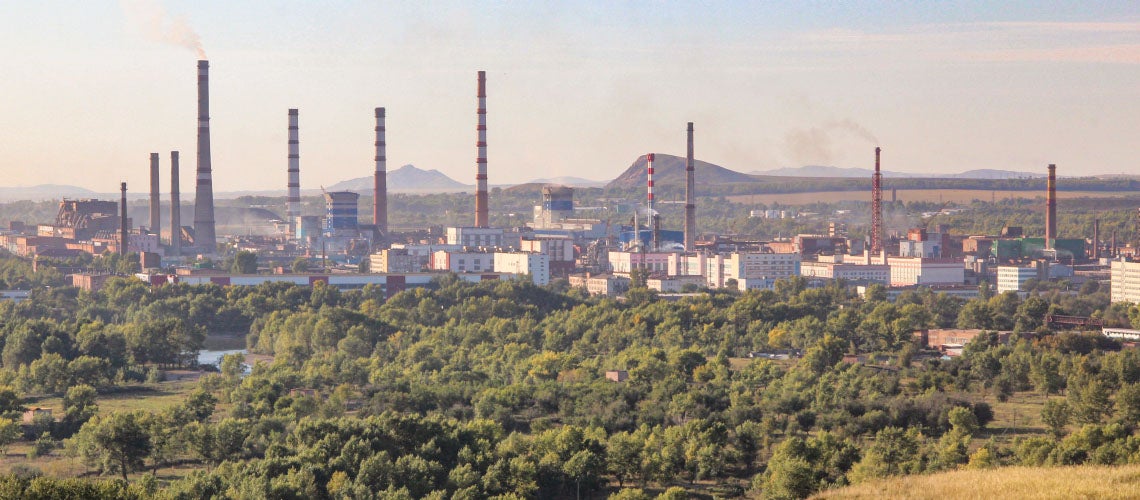 Plant in East Kazakhstan
Plant in East Kazakhstan
Kazakhstan is gearing up for a major transition that will put this nation of 19 million squarely among the top-ranking global economies by mid-century.
Oil and gas helped drive Kazakhstan’s development success in the past – the petroleum industry accounts for 50% of total exports and 30% of government tax revenues—but stagnating productivity and falling growth underscore the limits of a fossil fuel dependent growth model.
Climate change also poses risks to the economy on several fronts. Global climate action raises risks for Kazakhstan’s competitiveness and sustainability as an oil and gas exporter and as one of the most energy- and carbon-intensive economies in the Europe and Central Asia region, it will face large transition risks from global and domestic mitigation policy. Kazakhstan’s huge agricultural resources that are critical for vulnerable rural populations also face increasing risks from changing climate patterns.
Achieving Kazakhstan’s ambitions will, therefore, require a more diverse economic base, greater inclusiveness, large public and private investments in infrastructure and technology, and yes—a greener development path.
The World Bank Group has launched today a Country Climate and Development Report (CCDR) for Kazakhstan, the most recent of a new core diagnostic that integrates climate change and development considerations.
The report confirms that acting on climate change can complement and catalyze the country’s economic transition, while delivering development benefits. It can increase economic growth, improve air quality and livability in cities, make the economy more resilient to climate impacts, and support long-term decarbonization. The Kazakhstan CCDR recommends action across four areas:
- Decarbonizing the energy system. The energy system (power, heat, transport, industry) generates over 80% of emissions and is a priority for decarbonization if Kazakhstan is to achieve its nationally determined contribution (NDC) goals by 2030 and reach carbon neutrality by 2060. Action is needed in the power sector due to the aging generation fleet and availability of cost-effective renewable energy alternatives. At the same time, the country needs to kickstart the electrification of transport, industrial process changes, and energy efficiency. Moreover, modernization of the energy system is critical to maintaining power system reliability and the downstream competitiveness of human resources and industry.
- Climate smart development in water, agriculture, and rangelands. Climate and anthropogenic stresses are expected to contribute to significant water scarcity within a decade. Desertification, soil salinization, and land degradation affect the long‑term viability of the agriculture sector—wheat yields in some regions are expected to decline by as much as 30–50% by 2050. Mainstreaming sustainability into the planning and management of water resources and introducing climate-smart agriculture and resilient land management practices can build climate resilience and mitigate some of the most adverse impacts. Greater carbon sequestration is possible from rangelands—particularly grasslands and forests—and would provide a potential net carbon sink of 20–40 Mt CO2-e. This could offset emissions from hard-to-abate sectors and reduce the cost of achieving net zero by 2060.
- Just Transition. The coal mining sector directly employs about 40,000 people and may face declining domestic demand. Affected people and communities in coal-dependent towns will require support through such a transition. Similarly, poorer households may require support to cope with rising energy prices as tariffs become more cost reflective to attract necessary investment into the sector. Vulnerable rural communities, particularly those dependent on agriculture and livestock, may also need support to address climate impacts.
- Creating an enabling environment. Kazakhstan’s climate transition, and its broader shift toward a higher-growth, less resource-dependent economy, will involve fundamental structural reforms to remove constraints to businesses, establish appropriate market incentives, and level the playing field across actors and sectors. This will help drive private sector vibrancy and the productivity gains essential for long-term growth.
The CCDR on Kazakhstan proposes measures that are urgently needed to catalyze this transition and estimates the level of investment. This can help inform Kazakhstan’s approach to a more diversified, competitive and sustainable economy while reducing the risks from climate change and global mitigation action.



Join the Conversation